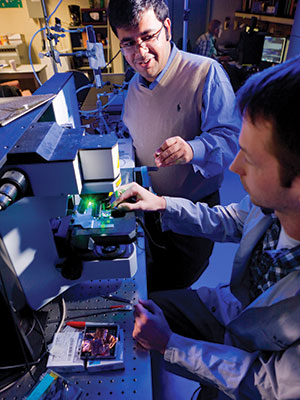Cancer Detection & Treatment, Medical Imaging, Stroke Prevention, Climate Change Analysis among Funded Initiatives
 Governor Andrew M. Cuomo today announced that seven research projects involving 10 SUNY campuses will each receive up to $100,000 from the SUNY Research Collaboration Fund, which supports research collaborations among campuses as part of the SUNY system’s strategic plan, The Power of SUNY. Among the funded initiatives are projects that seek to improve cancer detection and treatment, further medical imaging and diagnostics, and analyze the effects of climate change.
Governor Andrew M. Cuomo today announced that seven research projects involving 10 SUNY campuses will each receive up to $100,000 from the SUNY Research Collaboration Fund, which supports research collaborations among campuses as part of the SUNY system’s strategic plan, The Power of SUNY. Among the funded initiatives are projects that seek to improve cancer detection and treatment, further medical imaging and diagnostics, and analyze the effects of climate change.
“Not only does the SUNY system provide quality, affordable higher education opportunities to New Yorkers – but it is also an engine of research and development to increase innovation and grow our economy in New York State,” Governor Cuomo said. “The projects receiving awards today showcase a wide range of areas being explored in campuses across the SUNY system, and they all have potential to leave a positive and lasting impact on our health, environment and society. I applaud these award recipients and look forward to seeing their projects progress.”
“The broad range of SUNY’s scientific research is reflected in these awards and we will continue to incentivize cross-campus collaboration to promote the strength of working together as a system,” said SUNY Chancellor Nancy L. Zimpher. “Congratulations to the campuses, faculty, and students involved in these promising research projects.”
“The scope, scale, and diversity of SUNY’s research portfolio are on full display with the announcement of these awards,” said Dr. Tim Killeen, president of the Research Foundation for SUNY and SUNY’s vice chancellor for research. “Collaborative research invites industry interest and entrepreneurial opportunity that lead to innovation, new business, jobs, and public benefit. We congratulate each of the fund recipients for their visionary work.”
The purpose of the SUNY Research Collaboration Fund is to support collaboration among researchers and students across SUNY’s campuses in order to enhance the collective impact of their work and ability to advance science, innovation, and economic prosperity in New York State. The 2013 recipients are as follows:
- Cancer Treatment: A nanotechnology-enabled research project led by SUNY College of Nanoscale Science and Engineering (Thomas Begley) and Stony Brook University (Orlando D. Scharer) will provide a basis for identifying cancer patients who will respond well to specific chemotherapeutic regimens, thus promoting personalized medicine for the treatment of ovarian cancer.
- Cancer Detection: An interdisciplinary research project led by the University at Buffalo (Yijun Sun) and Downstate Medical Center (Brian McNeil) will examine the use of advanced computational algorithms to improve prognostic accuracy for prostate cancer.
- Developmental Biology: A collaboration led by SUNY Brockport (Adam Rich) and Upstate Medical University (Jeffrey Amack) will create a novel transgenic zebra fish that will extend our understanding of how gene function affects organ development and disease in the gastrointestinal system.
- Stress Treatment: A project conducted by Binghamton University (Richard E. Mattson, Matthew D. Johnson, Nicole Cameron), Upstate Medical University (Frank Middleton), and Stony Brook University (Joanne Davila) aims to develop an integrative genetic, developmental, and psychosocial framework that links social support and improved health outcomes in order to develop treatments that target the negative consequences of stress.
- Medical Imaging: A collaboration by Binghamton University (Chuan-Jian Zhong) and SUNY Potsdam (Maria Hepel) aims to develop a fundamental understanding of functional nanoprobes for detection of DNAs to aid in diagnostics and healthcare.
- Stroke Prevention: Research by Binghamton University (Chun-An Chou) and Upstate Medical University (Yahia Lodi) aims to develop a tool to help doctors make more informed medical decisions by predicting possible aneurism ruptures in patients, which often causes strokes and has a high mortality rate.
- Climate Change: A study by University at Albany (Scott Miller) and SUNY ESF (David Kieber) focuses on the physical, chemical, and biological processes that affect the emission of carbon dioxide to the atmosphere and how these can be expected to shift due to climate change.
This second annual round of Research Collaboration Fund awards attracted 77 proposals. Funded projects were selected through a rigorous peer-review process. Factors considered in the evaluation included: originality and significance of the research; student involvement; industry and other outreach efforts; and the ability to attract future federal, state, philanthropic, or private funding.


